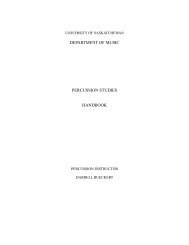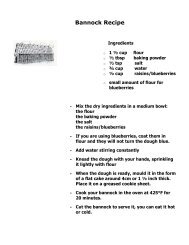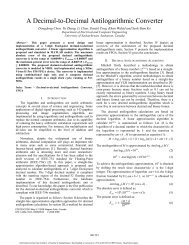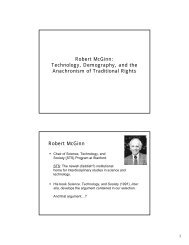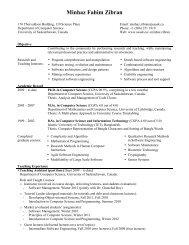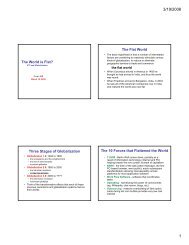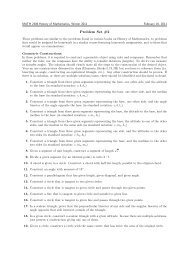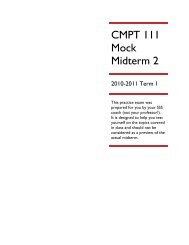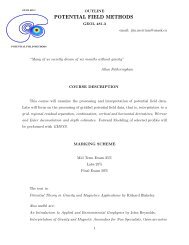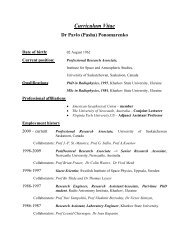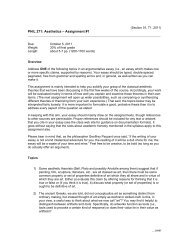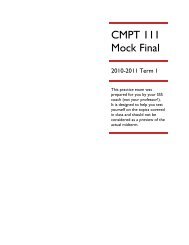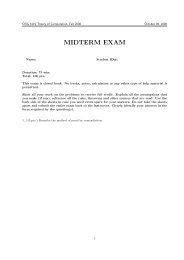Water Resources Engineering - Homepage Usask
Water Resources Engineering - Homepage Usask
Water Resources Engineering - Homepage Usask
You also want an ePaper? Increase the reach of your titles
YUMPU automatically turns print PDFs into web optimized ePapers that Google loves.
G3. WATER QUALITY MODELING<br />
(KUL-code: I882 (Th); I883 (Pr))<br />
Lecturer: JOLANKAI G. / VAN DER BEKEN A.<br />
ECTS-credit: 5 pts<br />
Contact hours: 30 hrs. of theory/30 hrs. of practical<br />
Prerequisites: Hydraulics (C5), Mathematics for water engineering (C2), <strong>Water</strong> quality and treatment<br />
(C10), Information technology (W1)<br />
Time and place: 1 st semester, 13 sessions of 3 hours each, VUB<br />
Course syllabus: Lecture notes (+ teaching software WQMCAL and its manual)<br />
Evaluation: Quotation of exercises (1/2) and presentation and discussion of an individual project (1/2)<br />
(detailed test and calculation exercises)<br />
Comparable handbook: De Smedt, F., 1989. Introduction to river water quality modeling. Hydrology-VUB, no.<br />
16<br />
Additional information: A comprehensive book (844 pages) was published, fairly recently, on this topic, which<br />
the students might use as additional information (extra learning tool): Chapra S.C.<br />
(1997) Surface <strong>Water</strong> Quality Modelling, McGraw-Hill Civil <strong>Engineering</strong> Series<br />
Learning objectives:<br />
The basic learning objective is to get the students acquainted with the basics of water quality modelling, that is<br />
to get knowledge on the basic transport and transformation processes on which the water quality models (all<br />
models) are based. This knowledge is (would be) unconditionally needed in using any commercially available<br />
model software and even more so in developing models for special purposes, to suit special tasks.<br />
More specific objectives include:<br />
General understanding of the system’s approach to managing the aquatic environment (with the meaning that a<br />
tool describing the response of aquatic systems to natural and anthropogenic inputs is needed to enable the<br />
efficient management of the water-environment). Another special objective is to help understand the basic<br />
principles of Integrated Catchment Management and of Integrated <strong>Water</strong> <strong>Resources</strong> Management. Another<br />
important objective is to teach the basic principles of the novel “ecohydrological” approach to managing water<br />
resources (with the meaning that the improvement of the aquatic and ecotone ecosystems by the appropriate<br />
hydrological control means, can help solving other water resources management problems of the same<br />
catchment). The very specific objective of the course is to enable students to see (through the use of the<br />
computer aided learning tool WQMCAL) the models in work and carry out a series of management-planning<br />
exercises (a kind of simulation of the actual work in managing the aquatic environment and assessing<br />
environmental impacts)<br />
The course contributes to the achieving of the objectives of the IUPWARE course in the following items:<br />
- A strong emphasis is laid on the Integrated Catchment Management concept (and not only on its modelling<br />
implications) and thus it deals with the interactions of the society and the water systems;<br />
- It deals with the modelling of water systems, mostly but not only regarding its water quality aspects;<br />
- It teaches the basic principles and tools of planning the management of the aquatic environment and along<br />
with it that of an integrated water system;<br />
- It will teach the basic management aspects of water systems, with special regard to pollution control;<br />
- It teaches the basic principles and tools of environmental impact assessment (the water and environmental<br />
engineering, but not the legal-administrative part of it).<br />
Course description:<br />
The aim of the course is to provide insight in the structure and application of water quality models for rivers and<br />
lakes (more details of the objectives are given above).<br />
The major lecture topics are as follows:<br />
Advanced studies in <strong>Water</strong> <strong>Resources</strong> <strong>Engineering</strong> / 27



